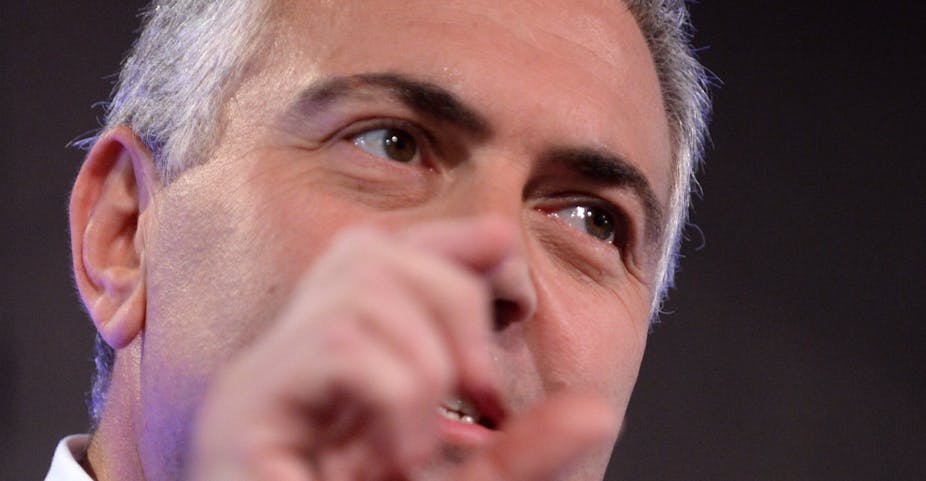Governments have “run out of money” and the “cashed up” private sector needs to step up investment, Treasurer Joe Hockey said today as he outlined this year’s G20 agenda.
“Too many tax payers’ dollars have been spent on corporate and middle class welfare and too often previous governments have been drawn into areas that are better left to the private sector,” Mr Hockey said in a speech at the Lowy Institute.
“The budget that we inherited from the previous government reflects the entitlement mentality that has dominated government decision making over recent years,” he said.
Hockey recommitted the government to achieving a budget surplus of 1% of GDP by 2023-24 – around A$23 billion if growth remains average – and said the May budget would move toward that “key goal”.
“Government budget deficits and high debt mean that the public sector cannot be relied upon, nor should it be, to deliver greater investment.”
But Mark Rolfe, a political science academic at the University of New South Wales, said Hockey’s speech was a political and ideological address “dressed up” as economics.
“He says all economic problems are because the last Labor government spent too big and had an ideology that put government in the centre of job creation,” he said.
“The [Parliamentary Budget Office] made it clear that the structural budget deficit started in the Howard years, and while Hockey says he’s not closing off any option, one he won’t consider is raising revenues by reinstating taxes cut by Howard.”
Hockey said Australia would focus instead on removing impediments to investment, and would be “leading from the front” when it came to the G20 agenda.
“Weak investment is a key contributor to below-par growth in many economies. Stronger demand, including from investment, could assist the process of normalising the currently accommodative monetary policy in advanced economies, with benefits for medium term financial stability,” he said.
Hockey said governments should use cash from privatisation to facilitate investment in other assets. Dr Rolfe said it was more reprioritisation rather than smaller government.
“Far from the government getting out of the way, it just shifts the government away from some areas [Hockey] doesn’t like to new areas that he favours. That’s where governments act as facilitators, in other words, stimulators,” he said.
Hockey praised the deregulation agenda of a number of developing countries, including India, Indonesia and Mexico, who have undertaken “significant reform” during and after the Global Financial Crisis.
He said Australia would “lead” with its plan that included “a strong infrastructure package to boost growth and lift productivity.”
Garry Bowditch, CEO of the SMART Institute at the University of Wollongong, urged the government to pay more attention to extracting value for money with major infrastructure projects.
“There are a number of factors required to improve the attractiveness of infrastructure as a long-term investment for private funding,” he said. “These include high design and construction costs, low asset utilisation owing to poor demand management and a reliance on a narrow revenue base such as user charges.”
Remy Davison, a lecturer in economics at Monash University, said the speech was a “G20 puff piece” and was softening up the Australian public for a razor-sharp budget.
He said the G20 agenda was “ambitious” and if implemented, “a significant step forward”. But he was pessimistic about about the chances for many of the significant reforms, including the harmonisation of international financial regulation and tax rules.
“The G20’s cheerleaders cite the 2009 London summit as its high-tide mark, with the US$5 trillion reflationary boost to the world economy and the IMF bulwark expanded to US$1 trillion,” Dr Davison said.
“In reality, virtually none of the commitments were new money. Detractors pointed to creeping protectionism throughout individual economies, as well as the G20’s much-vaunted lack of legitimacy. It excludes 90% of all countries, including major economies like Norway.”

